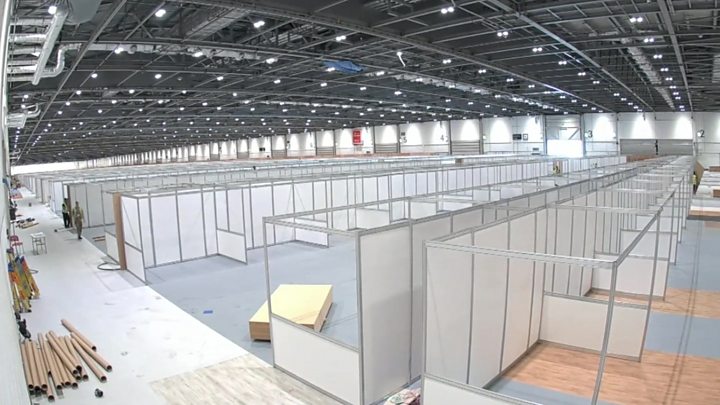
The first of the government's emergency field hospitals to treat coronavirus patients has opened in east London's ExCel centre.
The temporary NHS Nightingale Hospital is able to hold as many as 4,000 patients and will be staffed by NHS medics with help from the military.
Prince Charles paid tribute to staff as he opened the hospital via video link.
Similar hospitals are planned across the UK, including in Cardiff, Glasgow, Manchester, Harrogate and Bristol.
The ExCel exhibition space - usually used for large events such as Crufts and Comic Con - was transformed into a hospital in just nine days.
It is the first of several Nightingale Hospitals planned in England, with the latest announcement that two will be built at the University of the West of England in Bristol and the Harrogate Convention Centre.
Others are due to open at Birmingham's National Exhibition Centre and Manchester's Central Complex.
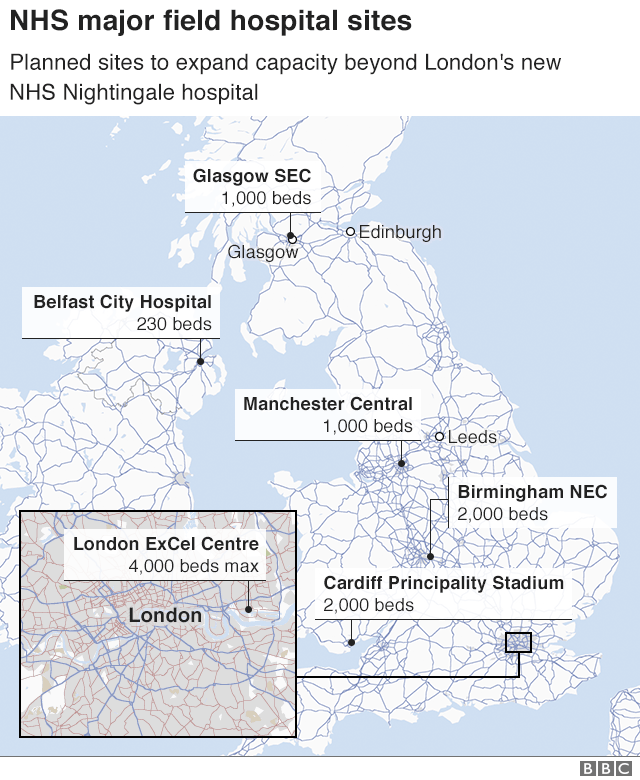
In Wales, more than 6,000 extra beds are being set up in temporary hospitals - many in sports and leisure facilities, including Cardiff's Principality Stadium.
In Scotland, a temporary hospital is being built at Glasgow's Scottish Events Campus (SEC). It could have capacity for as many as 1,000 beds and will be named the NHS Louisa Jordan after a nurse who served in Serbia during World War One.
And Belfast City Hospital's tower block will become Northern Ireland's first Nightingale hospital with 230 beds.
- How the UK's newest hospital was built in nine days
- Two more Nightingale hospitals announced
- In pictures: NHS Nightingale Hospital London
Prince Charles officially opened the new hospital with a message paying tribute to NHS staff via video link from his home on the royal Balmoral estate in Scotland.
Speaking following seven days of self-isolation after being diagnosed with the virus, he called it "a spectacular and almost unbelievable feat of work".
It shows "how the impossible could be made possible and how we can achieve the unthinkable through human will and ingenuity," he added, saying: "In this dark time, this place will be a shining light."
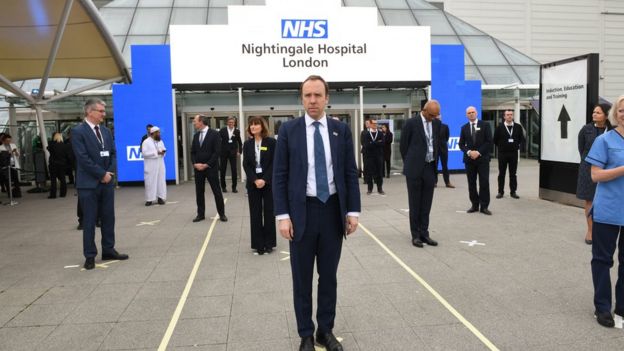 PA MEDIA
PA MEDIA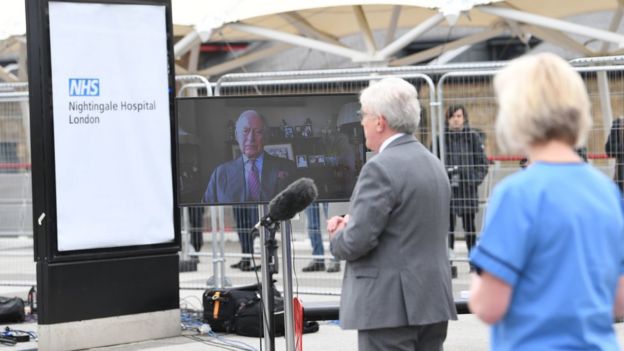 PA MEDIA
PA MEDIA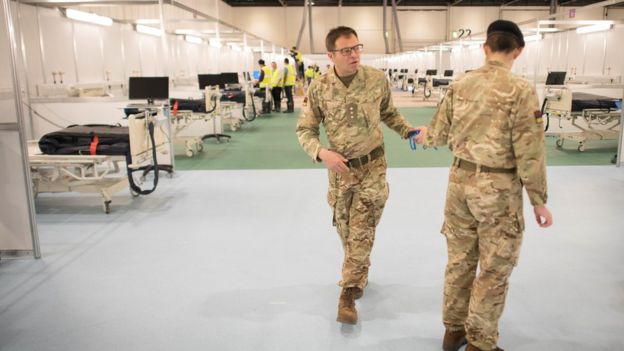 REUTERS
REUTERS
London's Nightingale hospital initially has 500 beds in place, with space for another 3,500. It will care for patients with the virus in intensive care who have been transferred from other London hospitals.
Staff from across the NHS will be working there, including student nurses, medical students who have started work early and former doctors, nurses and other staff who have come out of retirement.
Also at the ceremony were Health Secretary Matt Hancock - who also recently came out of quarantine after having the virus - England's chief nursing officer, Ruth May, and the head of NHS Nightingale, Prof Charles Knight.
Ms May said it was "absolutely fitting" that the hospital was named after Florence Nightingale, who was an "iconic nursing leader of her time" and a "pioneer for infection control".
Mr Hancock said the construction of the hospital was "testament to the work and the brilliance of the many people involved", and it showed the "best of the NHS".
"In these troubled times with this invisible killer stalking the whole world, the fact that in this country we have the NHS is even more valuable than before," he said.
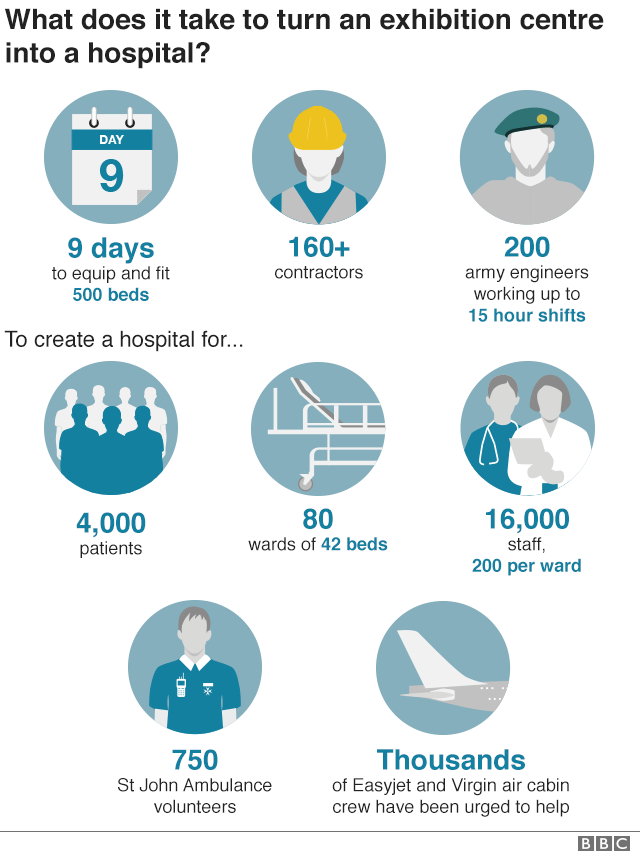
According to the latest figures, 2,921 people in the UK have died with the virus. The total is up by 569 from 2,352 the day before, which was the biggest day-on-day increase so far.
Earlier, amid controversy over the roll-out of testing for coronavirus in the UK, Mr Hancock said the government had "a huge amount of work to do" to meet its target of 100,000 tests a day in England by the end of April.
"It's got to happen. I've got a plan to get us there, I've set it as a goal and it's what the nation needs," he said.
The 100,000 could include both swab tests, that check if someone has the virus, and antibody blood tests, to check if someone has had the virus recently - but which have not yet come into widespread use.

- A SIMPLE GUIDE: How do I protect myself?
- AVOIDING CONTACT: The rules on self-isolation and exercise
- LOOK-UP TOOL: Check cases in your area
- MAPS AND CHARTS: Visual guide to the outbreak
- VIDEO: The 20-second hand wash
- STRESS: How to look after your mental health

Labour has called for more details on the plan, with shadow chancellor John McDonnell telling BBC Breakfast a breakdown of the type of tests that would make up the 100,000 target was needed.
Mr Hancock said he was not relying on new antibody blood tests to meet the goal.
It was possible almost all of them would be swab tests used to determine whether a person currently had coronavirus, he told BBC Radio 4's Today programme.
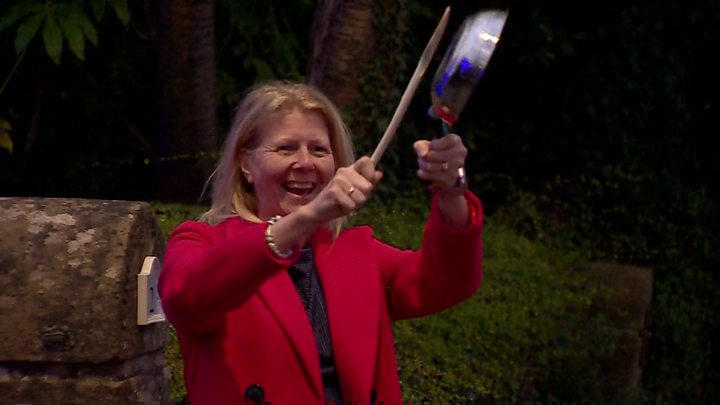
On Wednesday, there was capacity for 12,799 daily tests in England - although just 10,650 people were tested. The government's target by mid-April had been to test 25,000 per day.
In other developments:
- 560 new ventilators have been manufactured following a call for help from industry
- The BBC has announced it will offer the biggest education push in its history to help parents and children in virus lockdown
- A 36-year-old NHS nurse has died after spending weeks in intensive care with coronavirus
- Heathrow will close one of its runways next week as air traffic continues to fall
- On Thursday evening, people across the UK took part in a second "Clap for Carers" tribute, saluting NHS staff and other key workers

No comments:
Post a Comment